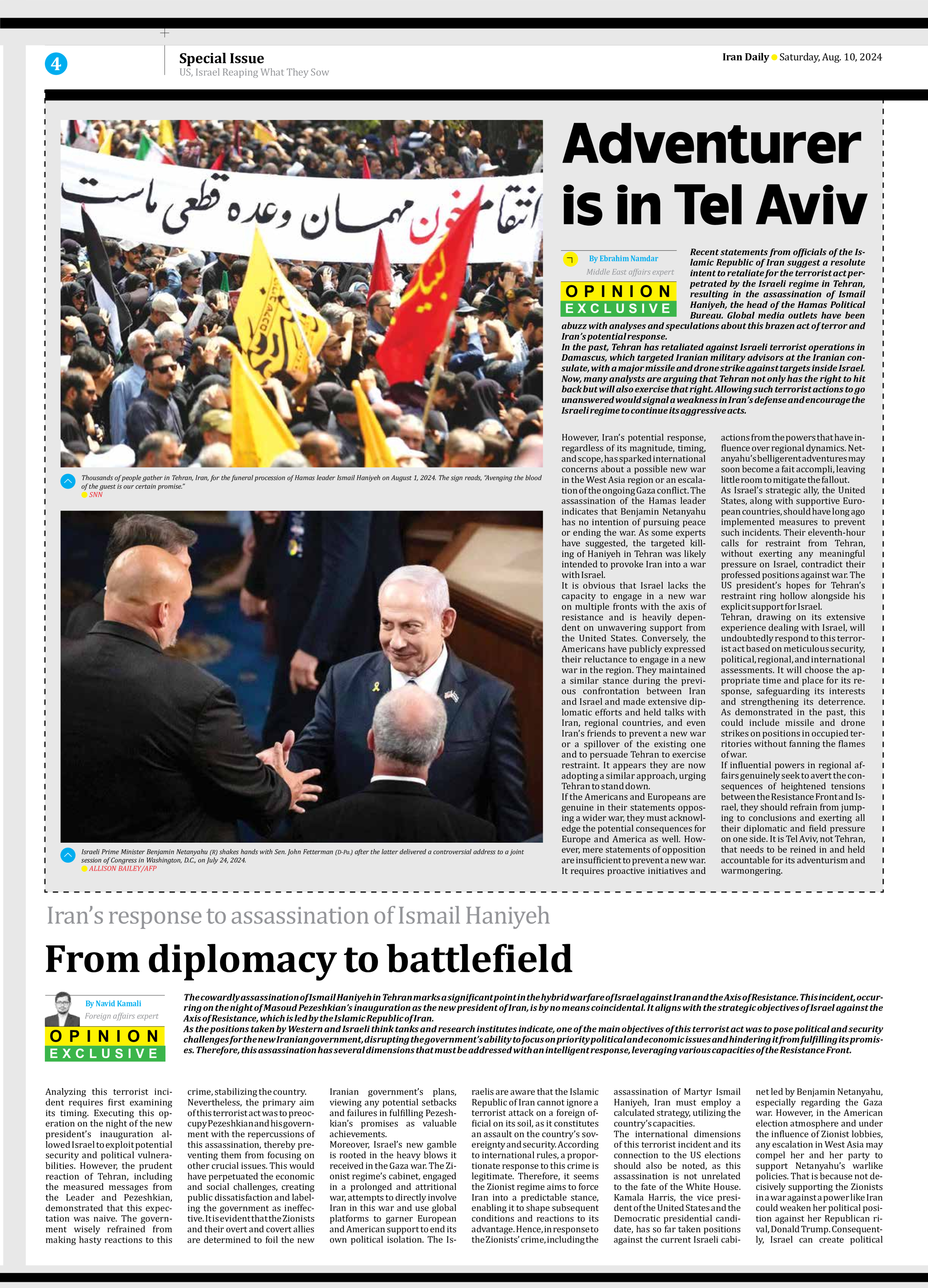
Adventurer is in Tel Aviv
Recent statements from officials of the Islamic Republic of Iran suggest a resolute intent to retaliate for the terrorist act perpetrated by the Israeli regime in Tehran, resulting in the assassination of Ismail Haniyeh, the head of the Hamas Political Bureau. Global media outlets have been abuzz with analyses and speculations about this brazen act of terror and Iran’s potential response. In the past, Tehran has retaliated against Israeli terrorist operations in Damascus, which targeted Iranian military advisors at the Iranian consulate, with a major missile and drone strike against targets inside Israel. Now, many analysts are arguing that Tehran not only has the right to hit back but will also exercise that right. Allowing such terrorist actions to go unanswered would signal a weakness in Iran’s defense and encourage the Israeli regime to continue its aggressive acts.
By Ebrahim Namdar
Middle East affairs expert
However, Iran’s potential response, regardless of its magnitude, timing, and scope, has sparked international concerns about a possible new war in the West Asia region or an escalation of the ongoing Gaza conflict. The assassination of the Hamas leader indicates that Benjamin Netanyahu has no intention of pursuing peace or ending the war. As some experts have suggested, the targeted killing of Haniyeh in Tehran was likely intended to provoke Iran into a war with Israel.
It is obvious that Israel lacks the capacity to engage in a new war on multiple fronts with the axis of resistance and is heavily dependent on unwavering support from the United States. Conversely, the Americans have publicly expressed their reluctance to engage in a new war in the region. They maintained a similar stance during the previous confrontation between Iran and Israel and made extensive diplomatic efforts and held talks with Iran, regional countries, and even Iran’s friends to prevent a new war or a spillover of the existing one and to persuade Tehran to exercise restraint. It appears they are now adopting a similar approach, urging Tehran to stand down.
If the Americans and Europeans are genuine in their statements opposing a wider war, they must acknowledge the potential consequences for Europe and America as well. However, mere statements of opposition are insufficient to prevent a new war. It requires proactive initiatives and actions from the powers that have influence over regional dynamics. Netanyahu’s belligerent adventures may soon become a fait accompli, leaving little room to mitigate the fallout.
As Israel’s strategic ally, the United States, along with supportive European countries, should have long ago implemented measures to prevent such incidents. Their eleventh-hour calls for restraint from Tehran, without exerting any meaningful pressure on Israel, contradict their professed positions against war. The US president’s hopes for Tehran’s restraint ring hollow alongside his explicit support for Israel.
Tehran, drawing on its extensive experience dealing with Israel, will undoubtedly respond to this terrorist act based on meticulous security, political, regional, and international assessments. It will choose the appropriate time and place for its response, safeguarding its interests and strengthening its deterrence. As demonstrated in the past, this could include missile and drone strikes on positions in occupied territories without fanning the flames of war.
If influential powers in regional affairs genuinely seek to avert the consequences of heightened tensions between the Resistance Front and Israel, they should refrain from jumping to conclusions and exerting all their diplomatic and field pressure on one side. It is Tel Aviv, not Tehran, that needs to be reined in and held accountable for its adventurism and warmongering.







